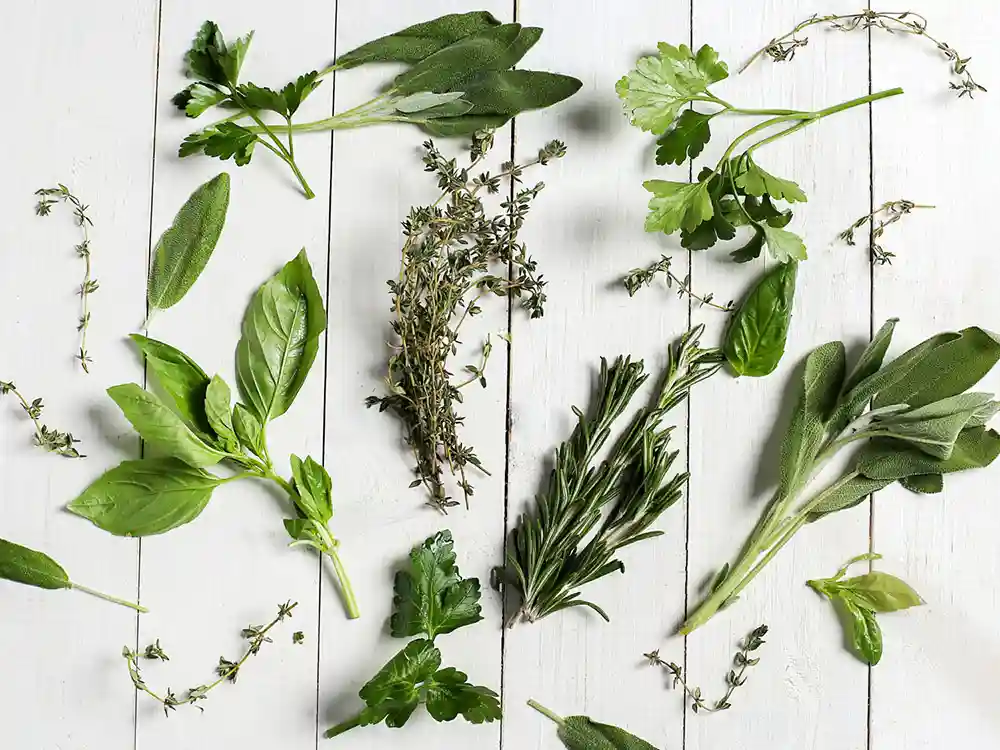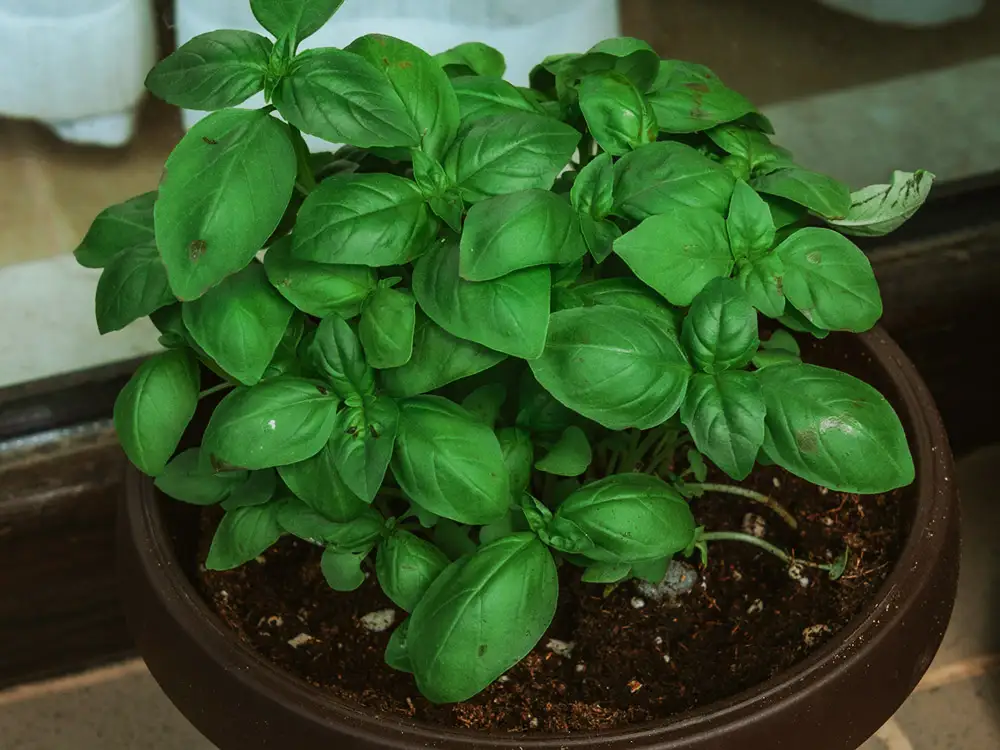Today we’re going to dive into one of the most crucial parts of herb gardening, finding the best fertilizer for herbs. Not all dirt is created equal, and your herbs, whether in pots or in the ground, need more than just water and sunlight to thrive. That’s where fertilizer comes in.
Our Favorite
No products found.
When it comes to finding the best fertilizer for herbs, Espoma Organic Garden-Tone Fertilizer is a standout choice. This product is designed to give your herbs the nutrients they need to flourish. It’s not just about feeding your plants, but also about creating a healthy soil environment where they can thrive. Plus, it’s organic, which means it’s safe for the environment and your family.
Specifications
- Formulation: Has a 3-4-4 ratio, the primary nutrients that herbs need.
- Specific Uses: It’s suitable for both cool and warm season vegetables and herbs.
- Application: Simply apply to the soil around the plant, then water thoroughly.
Pros
- Effective: Provides your herbs with the nutrients they need to grow healthy and flavorful.
- Organic: This product is approved for organic gardening, great choice for those who want to avoid synthetic fertilizers.
- Easy to Use: With clear instructions for application, using this fertilizer is a breeze.
Cons
- Smell: This fertilizer has a strong smell, which might be off-putting for some.
- Price: Some users might find this product to be a bit pricier than other options on the market.
- Availability: Depending on your location, this product may not be readily available in local stores and may need to be purchased online.
If you’re on the hunt for the best fertilizer for herbs, Espoma Organic Garden-Tone is the top contender. It provides the nutrients your plants need, is approved for organic gardening, and is easy to use. However, its smell and price might be a drawback for some.
Understanding the Importance of Fertilizer for Herbs
Think of fertilizer as a sort of multivitamin for your plants. They need a balanced diet of nutrients to grow strong, resilient, and flavorful. If you’re serious about your herb garden, you’ll want to provide the best possible care, and that means getting the best fertilizer for herbs.
The Role of Fertilizer in Herb Growth and Flavor
Fertilizer doesn’t just make your herbs grow bigger; it also affects the potency of their flavor and aroma.
The right balance of nutrients will give your herbs the boost they need to produce those aromatic oils that make them so valuable in our kitchens.
Summary: Best Fertilizer for Herbs
Best Organic Granular – Espoma Garden-Tone Plant Food
Granular Runner Up – Jobe’s Organics Granular Herb Plant Food
Best Natural Fertilizer – Wiggle Worm Pure Organic Worm Castings
Best Liquid Fertilizer – Neptune’s Harvest Fish & Seaweed Fertilizer
Water Soluble – Miracle-Gro Performance Organics for Edibles
More details on these products below.
Types of Fertilizers for Herbs

Organic vs. Synthetic Fertilizers: Pros and Cons
There’s been a great debate among gardeners about organic and synthetic fertilizers. Organic fertilizer for herbs can be slower-acting but can enrich the soil over time, while synthetic fertilizers provide a quicker nutrient boost.
Both have their place, but it’s crucial to understand your plants and soil needs.
Common Types of Organic Fertilizers
The world of organic fertilizers is vast and exciting. You might be familiar with compost, a homemade fertilizer for herbs that can be made right in your backyard. Other options include worm castings and fish fertilizer or seaweed-based fertilizers, which can provide a nutrient-rich diet for your herbs.
Fertilizers: Understanding NPK Ratios
Fertilizers come with a three-number ratio, known as the NPK ratio. This represents the amount of Nitrogen (N), Phosphorus (P), and Potassium (K).
These three elements are crucial in plant growth, but it’s essential to understand their individual roles and how to balance them for your herbs. We go more in-depth on this topic further down the page.
Our Picks: Best Fertilizer for Herbs
Choosing the best fertilizer for your herbs can be overwhelming, but don’t worry, we’re here to help! We’ll be looking at some top-rated fertilizers and giving you the low-down on what makes them great.
Whether you’re looking for an organic fertilizer for herbs, a liquid fertilizer for herbs, or a fertilizer for herbs in pots, we’ve got you covered.
Granular Runner Up
No products found.
If you’re on the hunt for the best fertilizer for herbs, Jobe’s Organics will be your new best friend. This granular plant food is easy to use and store. It’s specially formulated to provide your herbs with the nutrients they need for healthy growth and abundant blooms.
Specifications
- Formulation: The fertilizer has a guaranteed analysis of 2-5-3, which means it contains 2% nitrogen, 5% phosphorus, and 3% potassium.
- Microbe Package: Contains a proprietary microbe package, Biome with archae that rapidly breaks down and improves soil condition over time.
- Application Frequency: For best results, apply this fertilizer every 4-6 weeks to ensure that your plants get a steady supply of nutrients.
Pros
- Effective: This fertilizer provides your herbs with the nutrients they need to grow healthy.
- Improves Soil Condition: Helps plants absorb nutrients faster, but it also improves the soil condition over time.
- Eco-Friendly: Safe for the environment, making it a great choice for eco-conscious gardeners.
Cons
- Smell: This fertilizer has a strong smell, which might be off-putting for some.
- Indoor Use: Due to its smell, it might not be suitable for indoor use.
In conclusion, Jobe’s Organics is a solid choice if you’re looking for the best fertilizer for herbs. It provides your plants with the nutrients they need, improves soil condition, and is safe for the environment. However, its strong smell might be a deal-breaker for some.
Best Natural Fertilizer
No products found.
If you’re searching for the best fertilizer for herbs, Wiggle Worm 100% Pure Organic Worm Castings could be the answer. This product is not just a fertilizer, it’s a soil builder that improves the structure and fertility of your soil. It’s made from pure worm castings, which are rich in nutrients and beneficial microbes.
Specifications
- Pure Earthworm Castings: Made from 100% pure earthworm castings, providing a nutrient-rich and mineral-dense soil amendment.
- Improves Soil Structure: Tiny, football-shaped particles that prevent soil packing, improves aeration, and enhances water retention.
- Natural Insect Repellent: Wiggle Worm Pure Worm Castings can help control plant pests such as whiteflies, spider mites, and aphids.
Pros
- Effective: Wiggle Worm provides your herbs with essential nutrients, promoting healthy growth and productivity.
- Organic: This product is organic, making it a safe choice for your plants and the environment.
- Easy to Use: A little goes a long way with Wiggle Worm. Just apply a handful to the soil above the root zone three times a year or to the hole during transplant or seeding. You can also make a compost tea with it.
Cons
- Smell: As with many organic fertilizers, some users may find the smell of this product to be strong or unpleasant.
- Price: Some users might find this product to be a bit pricier than other options on the market.
- Availability: Depending on your location, this product may not be readily available in local stores and may need to be purchased online.
In your quest for the best fertilizer for herbs, Wiggle Worm 100% Pure Organic Worm Castings emerges as a strong candidate. It delivers essential nutrients to your plants, enhances the structure of the soil, and maintains an organic profile. However, its distinctive odor and cost could be potential downsides for some.
Best Liquid Fertilizer
No products found.
When it comes to finding the best fertilizer for herbs, Neptune’s Harvest Fish & Seaweed Blend Fertilizer is a standout option. This special concoction of fish hydrolysate and seaweed is tailored to nourish your herbs, providing them with the essential nutrients they need to grow robustly. But it’s not just about feeding your plants, it’s about fostering a fertile soil environment where they can truly prosper.
Specifications
- Fish Hydrolysate and Seaweed Fusion: A distinctive fusion of fish hydrolysate and seaweed, offering a nutrient-rich and mineral-dense soil enhancer.
- Boosts Plant Vitality: This product is recognized for enhancing the natural sugar in plants, leading to more vibrant and healthier herbs.
Pros
- Efficiency: Neptune’s Harvest delivers essential nutrients to your herbs, fostering healthy growth and productivity.
- Organic Nature: Being an organic product, it’s a safe and eco-friendly choice for your plants.
- User-Friendly: With detailed instructions for application, using this fertilizer is straightforward and hassle-free.
Cons
- Odor: Similar to many organic fertilizers, some users may perceive the odor of this product as strong or disagreeable.
- Cost: Some users might consider this product to be slightly more expensive than other alternatives in the market.
- Accessibility: This product may not be readily accessible in local stores and may necessitate online purchase.
To wrap it up, Neptune’s Harvest Fish & Seaweed Blend Fertilizer is a formidable candidate when you’re on the hunt for the best fertilizer for herbs. It not only supplies the nutrients your plants crave but also enhances plant vitality and is organic. However, its distinctive odor and cost could be potential downsides for some.
Water Soluble
No products found.
If you’re on the hunt for the best fertilizer for herbs, Miracle-Gro Performance Organics Edibles Plant Nutrition deserves your attention. This organic plant food is crafted to nourish your herbs, setting the stage for a generous yield. It’s an excellent pick for those dreaming of a verdant, fruitful herb garden. However, remember that every garden and gardener has different needs, and what’s perfect for one might not be the same for another.
Specifications
- Certified Organic: This product is OMRI Listed, which means it adheres to organic farming standards.
- User-Friendly Application: You can effortlessly apply this plant food with a watering can.
- Generous Coverage: Paired with the Miracle-Gro Performance Organics Garden Feeder, it can cover up to 265 sq. ft.
Pros
- Immediate Nourishment: This plant food provides immediate nutrition to your herbs, encouraging rapid growth and a plentiful harvest.
- Organic Composition: Being an OMRI listed product, it’s an ideal choice for those committed to organic gardening.
- Convenience: The flexibility to apply this plant food with a watering can or a garden feeder adds to its user-friendliness.
Cons
- Solubility Concerns: There have been occasional reports of the fertilizer not fully dissolving in water.
- Odor: As is common with many organic fertilizers, the scent might be a bit potent for some.
Miracle-Gro Performance Organics Edibles Plant Nutrition is a formidable player in the race for the best fertilizer for herbs. Its organic makeup and immediate feeding feature distinguish it from many competitors. However, it’s crucial to keep your specific gardening requirements and tastes in mind when selecting a product.
The Nutrient Needs of Herbs: An In-depth Exploration
You wouldn’t feed a cat the same food as a giraffe, right? Well, herbs are no different. Each type of herb has its own specific nutrient needs, so understanding these needs is key to finding the best fertilizer for herbs. In general, plants need two types of nutrients: macronutrients and micronutrients.
Macronutrients and Micronutrients: What Do Herbs Need?
When we talk about plant nutrition, we often categorize nutrients into two groups: macronutrients and micronutrients.
Macronutrients are needed in large amounts and include elements like Nitrogen (N), Phosphorus (P), and Potassium (K).
Micronutrients, though required in smaller amounts, are equally important for plant health and include elements like Iron (Fe), Manganese (Mn), and Zinc (Zn).
A deficiency in any one of these nutrients can cause issues with your plant’s growth and health, while an excess can also create imbalances and negatively affect your plant.
The Importance of Nitrogen, Phosphorus, and Potassium in Herb Growth
Nitrogen (N), Phosphorus (P), and Potassium (K)—collectively referred to as NPK—are the three primary macronutrients that plants need in the largest amounts.
Nitrogen is vital for the growth of the leafy, green parts of plants. It’s essentially the engine that drives plant growth, contributing to the development of proteins, enzymes, and chlorophyll. This makes it particularly important for herbs since their flavorful leaves are usually the part we’re most interested in.
Phosphorus plays a vital role in energy transfer and storage in plants. It aids in root development, flowering, and fruiting. While herbs aren’t often grown for their flowers or fruits, a healthy root system is key for overall plant health and vigor.
Potassium, on the other hand, is the great regulator. It helps plants make better use of light and air, improves the strength of plant tissue, and aids in the movement of water and nutrients within the plant.
Getting the balance of these three nutrients right in your fertilizer for herbs is crucial. Too much nitrogen, for example, can cause leafy growth at the expense of root development, potentially resulting in a more fragile plant.
On the other hand, insufficient phosphorus or potassium could limit your plant’s growth potential and overall health.
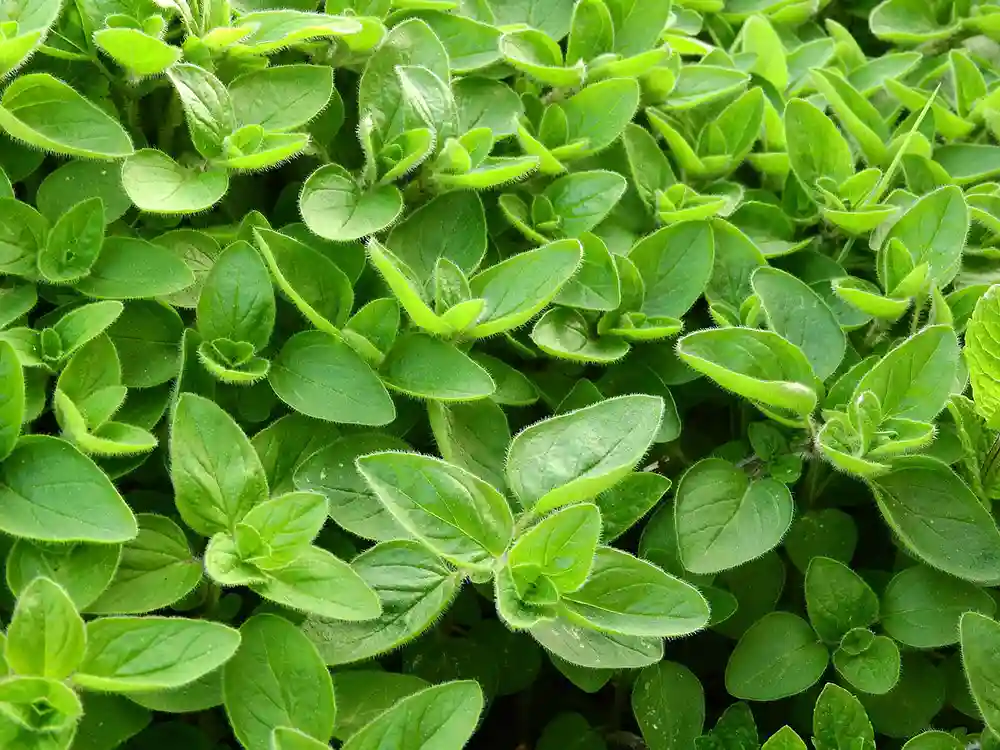
Secondary Macronutrients and Micronutrients: Their Role in Herb Health
Beyond the “big three” (NPK), plants also require secondary macronutrients—Calcium (Ca), Magnesium (Mg), and Sulfur (S)—as well as a range of micronutrients, such as Iron (Fe), Manganese (Mn), and Zinc (Zn). These nutrients, though required in lesser amounts, are essential for various physiological functions in the plant.
For instance, Calcium is crucial for the growth of plant cells and plays a role in nutrient uptake. Magnesium is a vital part of the chlorophyll molecule, playing a role in photosynthesis. Iron is essential in chlorophyll synthesis, and a lack of it can lead to yellowing leaves, a condition known as chlorosis.
In the case of micronutrients, they are often involved in enzymatic reactions.
Ensuring your herbs get a balanced diet of all these nutrients is key to their health and productivity. That’s why it’s important to choose a comprehensive fertilizer for herbs that supplies not just the primary macronutrients but also a broad range of secondary and micronutrients.
Whether you choose to use a synthetic fertilizer or opt for an organic fertilizer for herbs, ensuring the correct nutrient balance will help you grow strong, healthy, and flavorful herbs.
Fertilizing Different Types of Herbs
| Herb | Preferred Soil Type | Fertilizer Suggestions |
|---|---|---|
| Lavender, Marjoram, Mint, Thyme | Poor/Light Soil | Minimal fertilization, low-rate balanced organic fertilizer |
| Oregano, Rosemary | Average Soil | Balanced organic fertilizer or well-composted manure |
| Basil, Chervil, Chives, Dill, Sage, Savory, Tarragon, Garlic, Parsley | Moderately Rich Soil | Slow-release granular or liquid fertilizer with balanced NPK ratio |
Understanding the Nutrient Needs of Different Herbs
Not all herbs have the same nutrient needs. Some herbs prefer poor or light soil, while others thrive in moderately rich soil. Understanding your herbs’ individual needs is key to picking the right fertilizer for herbs indoors or growing herbs on a balcony outdoors.
Herbs That Prefer Poor/Light Soil
These herbs are robust and can grow in less nutrient-dense soil are Lavender, Marjoram, Mint, and Thyme. A lighter touch with the fertilizer is recommended for these.
Herbs That Prefer Average Soil
These herbs do well with a balanced nutrient soil are Oregano and Rosemary. A regular schedule of balanced fertilizer is best for these herbs.
Herbs That Prefer Moderately Rich Soil
Basil, Chervil, Chives, Dill, Sage, Savory, Tarragon, Garlic, and Parsley are herbs appreciate a bit more nutrients. Consider using a natural fertilizer for herbs to enrich your soil.
How to Fertilize Your Herbs: A Detailed Guide
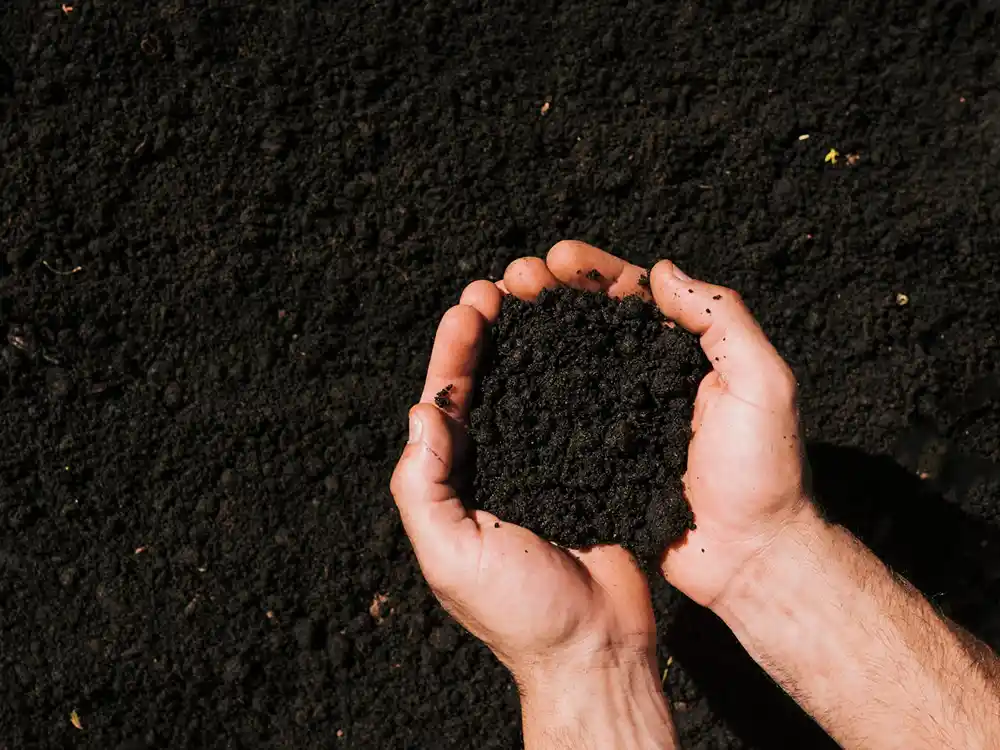
Let’s get our hands dirty and dive into the practical aspects of fertilizing your herbs. It’s not as simple as throwing some fertilizer on your plants and calling it a day; there’s a bit of strategy and know-how involved.
Fertilizing Herbs in the Ground: The Role of Compost and Top-Dressing
Growing herbs in the ground offers them a chance to spread their roots far and wide, but it also means they’ll be competing with other plants for nutrients.
The first step is to ensure that your soil is well-prepared before planting. This usually means mixing in organic matter, such as compost or well-rotted manure, which can provide a good start for your herbs.
Compost is a beautiful thing for gardeners. It’s basically decomposed organic matter, teeming with essential nutrients that plants need. Plus, it helps improve the soil’s structure, making it easier for plant roots to access those nutrients.
Once your herbs are planted, you’ll want to top-dress with compost or another balanced organic fertilizer a few times throughout the growing season. Top-dressing is simply a matter of spreading the compost around the base of the plants, avoiding the stems.
Fertilizing Herbs in Containers: Frequency and Best Practices
If you’re growing herbs in pots, the game changes a little bit. Herbs grown in containers are in a more controlled environment, but they also have less soil from which to draw nutrients, and water can leach those nutrients out of the soil more quickly.
So, when it comes to container gardening, a regular feeding schedule is essential. This will usually mean applying a liquid fertilizer for herbs every two weeks to a month, depending on the specific fertilizer you’re using and the herbs you’re growing.
Always follow the instructions on the fertilizer package to avoid overfeeding!
Quick Tip: If you’re using a water soluble fertilizer, it’s a good idea to water your plants first before applying the fertilizer. This helps avoid any potential root burn from the concentrated fertilizer solution.
The Use of Slow-Release Granular Fertilizers and Liquid Fertilizers
When it comes to choosing between a slow-release granular fertilizer or a liquid fertilizer for herbs, it’s helpful to know the pros and cons of each.
Slow-release fertilizers are great for providing a long-term supply of nutrients. You usually need to apply them only once or twice a season, and they’ll gradually release nutrients over several weeks or months. They’re a good choice for in-ground gardens or larger containers.
Liquid fertilizers, on the other hand, are quickly absorbed by the plants, providing a fast-acting nutrient boost. They’re particularly well-suited for container plants, which need more frequent feeding.
In the end, the best fertilizer for herbs is the one that suits your particular plants, soil, and gardening habits. And remember, when it comes to fertilizer, more isn’t always better. Overdoing it can lead to excessive leafy growth at the expense of the flavorful oils that make herbs such a joy to grow and use in the first place.
Common Mistakes in Fertilizing Herbs: Avoid These Pitfalls
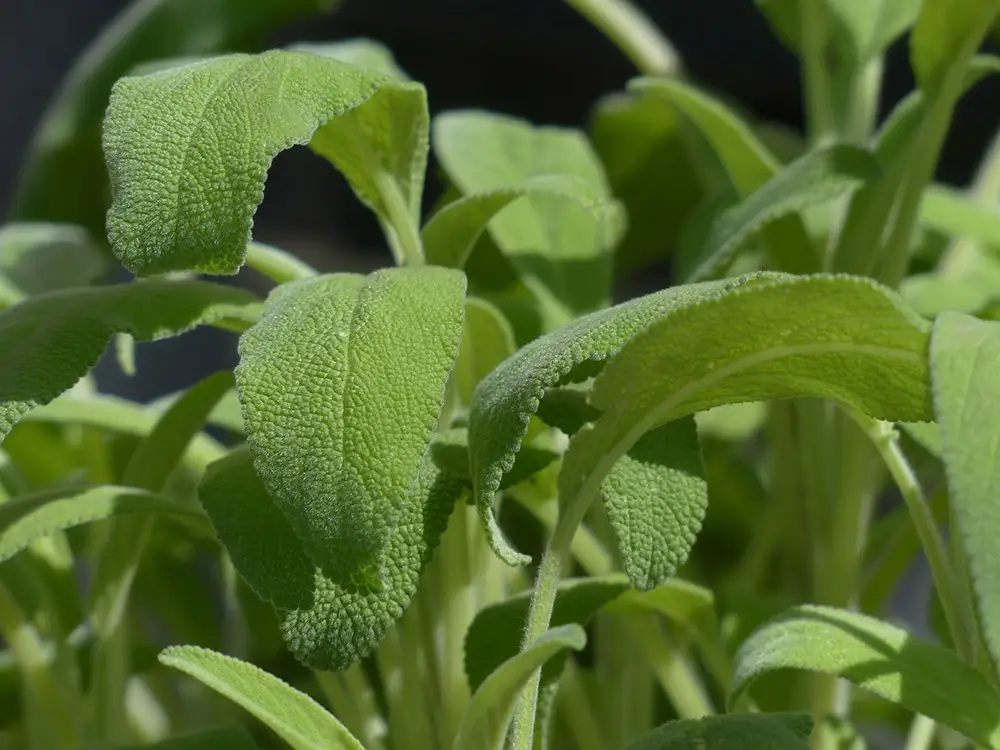
While fertilizing your herbs is generally beneficial, there are some common mistakes that gardeners often make, which can be detrimental to your plants’ health. Let’s explore these mistakes so that you can avoid them and give your herbs the best care possible.
The Risks of Overfeeding and Underfeeding Your Herbs
Balance is key in herb fertilization. Both overfeeding and underfeeding your herbs can lead to adverse outcomes.
Overfeeding, or applying too much fertilizer, can lead to excessively fast growth, often leading to lanky, weak plants. Additionally, it can “burn” your plants, causing leaf tip browning and potentially root damage. This is a common mistake made by beginning herb gardeners.
Overuse of nitrogen-heavy fertilizers can lead to a surplus of leafy growth but can diminish the concentration of the essential oils that give herbs their aroma and flavor.
Underfeeding, on the other hand, can lead to stunted growth and yellowing leaves. Herbs with insufficient nutrients may also be more susceptible to disease and insect pests. If your herbs seem lackluster despite receiving ample water and sunlight, underfeeding may be the culprit.
The Danger of Ignoring Soil pH
This one is often overlooked when discussing fertilization, but it’s just as important. The pH level of your soil can greatly affect the availability of nutrients to your plants. Most herbs prefer a slightly acidic to neutral soil pH (around 6.0 to 7.0). If your soil is too acidic or too alkaline, it can limit your plants’ ability to take up certain nutrients, leading to deficiencies even if those nutrients are present in the soil.
If you’re noticing issues with your plants despite fertilizing correctly, it may be worth having your soil tested to determine its pH level. You can adjust your soil’s pH using specific soil amendments, such as lime to raise pH (make it more alkaline) or sulfur to lower pH (make it more acidic).
By keeping these common mistakes in mind and learning how to avoid them, you can use fertilizer more effectively to grow healthy, flavorful herbs. Remember, the best fertilizer for herbs is one applied with knowledge and care.
Conclusion
Finding the best fertilizer for herbs doesn’t have to be complicated. Remember, it’s about balance—providing a balanced diet of nutrients that cater to the specific needs of your herbs, without overdoing it.
FAQ: Best Fertilizer for Herbs
Is 10 10 10 fertilizer good for herbs?
Yes, a 10-10-10 fertilizer (indicating equal parts Nitrogen, Phosphorus, and Potassium) can be effective for herbs. It provides a balanced nutrient supply, though individual herb species might benefit from specific nutrient ratios.
What is the best natural fertilizer for herbs?
Compost or well-rotted manure is often considered the best natural fertilizer for herbs. These materials improve soil structure and provide a broad range of nutrients necessary for healthy plant growth.
What is the best fertilizer for basil plants?
Basil plants prefer a balanced fertilizer, but with a slight lean towards nitrogen. A good choice would be a 10-7-7 fertilizer, which will encourage leafy growth without overwhelming the plant.
What is the best fertilizer for thyme?
Thyme prefers a lean, well-draining soil and doesn’t require much fertilization. If needed, use a low-rate, balanced organic fertilizer or well-composted manure.
What is the best fertilizer for parsley?
Parsley benefits from a balanced fertilizer. A slow-release granular or liquid fertilizer with equal parts Nitrogen, Phosphorus, and Potassium (like a 10-10-10) works well.
